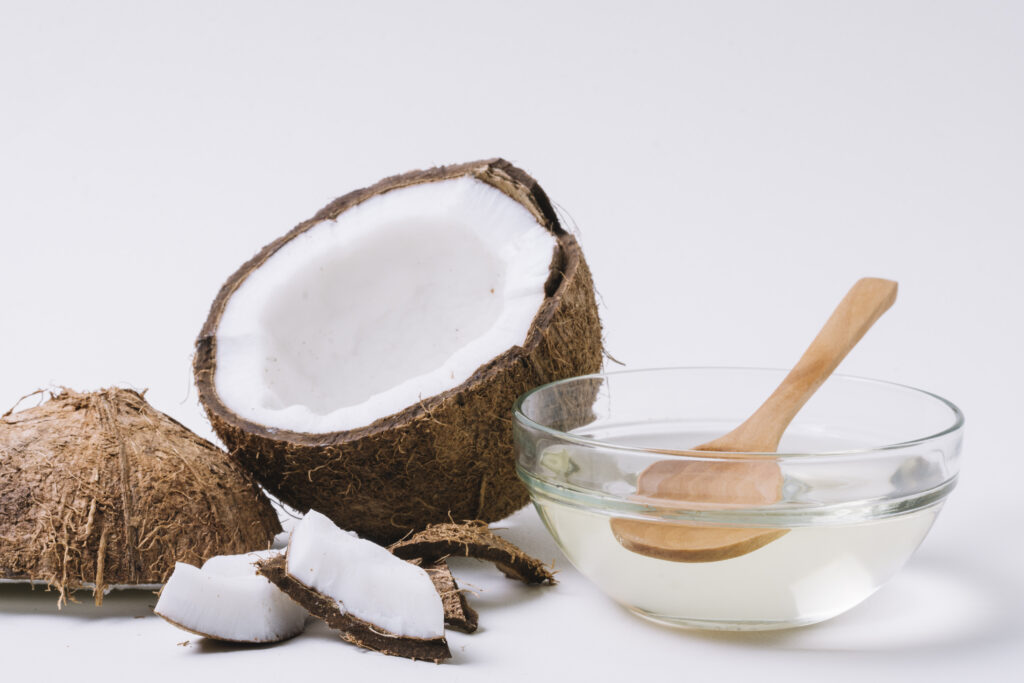
Nutritional Facts of Coconut Oil
1 tablespoon of coconut oil contains:1
- 121 calories
- 0g of protein
- 13.5g of fats (11.2g is saturated)
- 0 mg of cholesterol
- Contains vitamin E, but no fiber and negligible other vitamins and minerals.
- Close to 100% of fats, most of which is saturated.
- High in MCT (Medium-chain triglycerides), which is easier to burn off compared to normal long-chain triglycerides.
How Does It Benefit Us?
Studies suggest that coconut oil can:
- Increase number of calories burned by our body
- Reduce appetite, due to quickly absorbed form of MCT that promotes satiety and prevents fat storage 2
- Raises HDL (good cholesterol), which is linked to improved metabolic health and lower risk of heart disease
- Local application can work as skin moisturizer, protecting against skin damage
Cooking Coconut Oil And Beyond
Cooking 3
Ideal for cooking as 90% of its fatty acids are saturated, making it extremely stable at high temperature.
Can be substituted for oil or butter in 1:1 ratio in most recipes
- Sauteing or stir-frying, use 1-2 tablespoon of this oil to cook vegetables, eggs, meat or fish
- Popcorn, drizzle melted coconut oil on popcorn
- Baking, use it to coat poultry or meat before rubbing with seasonings
Beyond-cooking 4
Coconut oil shines as a beauty product, especially extra-virgin coconut oil.
It is often used topically to:
- Moisturize skin for atopic dermatitis or eczema patient
- As an antifungal and antiviral agent against skin infections
Extra-virgin vs refined coconut oil 1
1. Extra virgin coconut oil:
- Comes from fruit of fresh, mature coconuts.
- Processing does not involve high temperature or added chemicals.
2. Refined coconut oil:
- Goes through more processing, leads to more neutral smell and flavour.
TIPS: To avoid nausea and loose stools that may occur with high intake of coconut oil, it is advisable to take 1 teaspoon per day and gradually increase to 2 tablespoons per day over 1-2 weeks. 3
Enough of The Good, What’s Bad?
Coconut oil contains a majority of saturated fat and this contributes to cardiovascular disease as it can increase plasma low-density lipoprotein (LDL, commonly known as ‘bad cholesterol’) concentration.
Conclusion
In culinary practice, it is advisable to replace coconut oil with non-tropical unsaturated vegetable oils such as avocado oil, especially for people who have cardiovascular risk. As for local applications, coconut oil appears to be safe.
Reference
- Coconut oil: Benefits, uses, and controversy [Internet]. Medicalnewstoday.com. Available from: https://www.medicalnewstoday.com/articles/282857#the_bottom_line
- Coconut Oil [Internet]. The Nutrition Source. Available from: https://www.hsph.harvard.edu/nutritionsource/food-features/coconut-oil/
- How to Eat Coconut Oil, and How Much Per Day? [Internet]. Healthline. Available from: https://www.healthline.com/nutrition/how-to-eat-coconut-oil#TOC_TITLE_HDR_5
- Migala J, Kelly Kennedy R. Coconut Oil: Health Benefits, Nutrition Facts, Uses, and More | Everyday Health [Internet]. EverydayHealth.com. 2019. Available from: https://www.everydayhealth.com/diet-nutrition/diet/coconut-oil-health-benefits-nutrition-facts-uses-more/
- Sacks F. Coconut Oil and Heart Health. Circulation. 2020;141(10):815-817.
Latest Health Info
Healthy Weight, Happy Joints
How Does Weight Affect Knee Health? The Link Between Pounds And Pain Osteoarthritis (OA) involves the degeneration of joints, which ...
The Gut Warriors: Prebiotics, Probiotics and Postbiotics
When it comes to gut health, you’ve probably heard of prebiotics and probiotics. But did you know there’s also ...
Tip Moreh: Masa Berbuka Puasa
Moreh adalah tradisi unik yang biasanya diadakan selepas solat tarawih pada bulan Ramadan. Ia melibatkan penyediaan dan perkongsian makanan ringan ...




